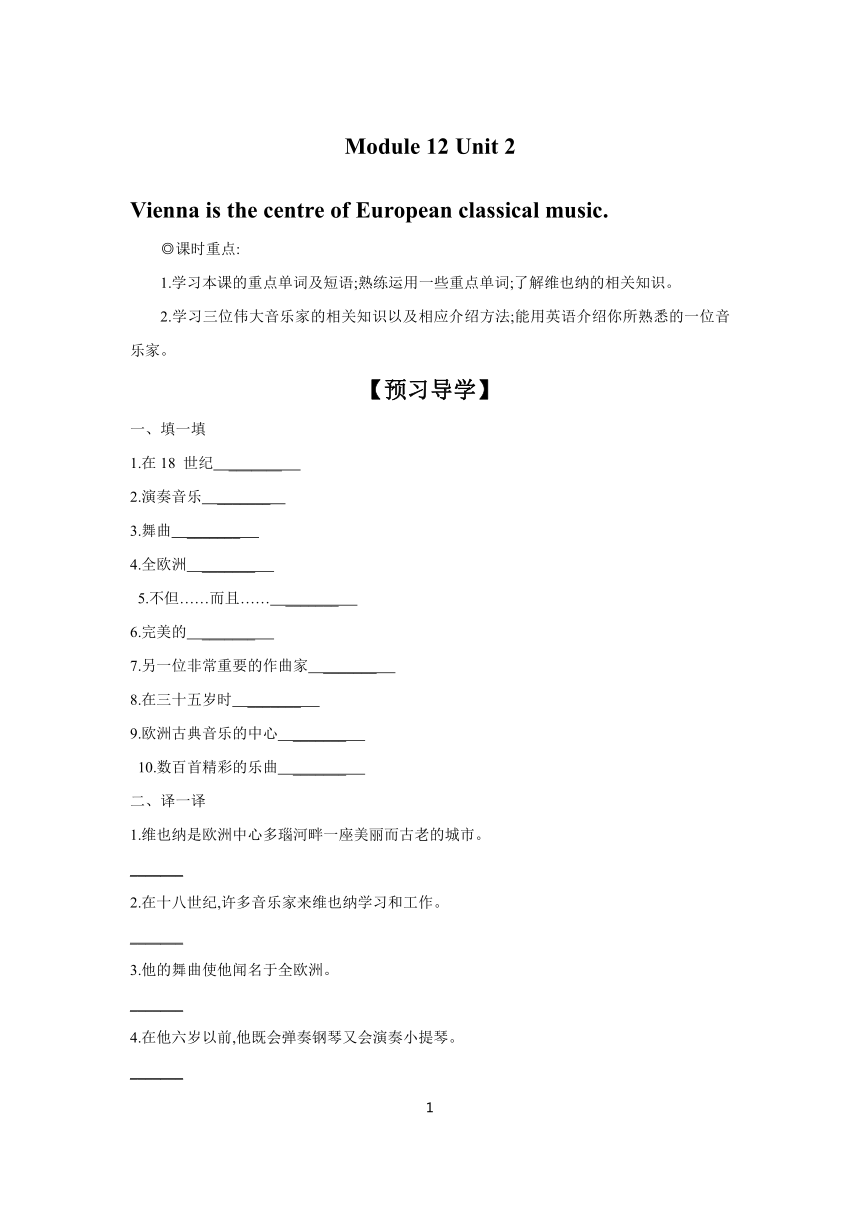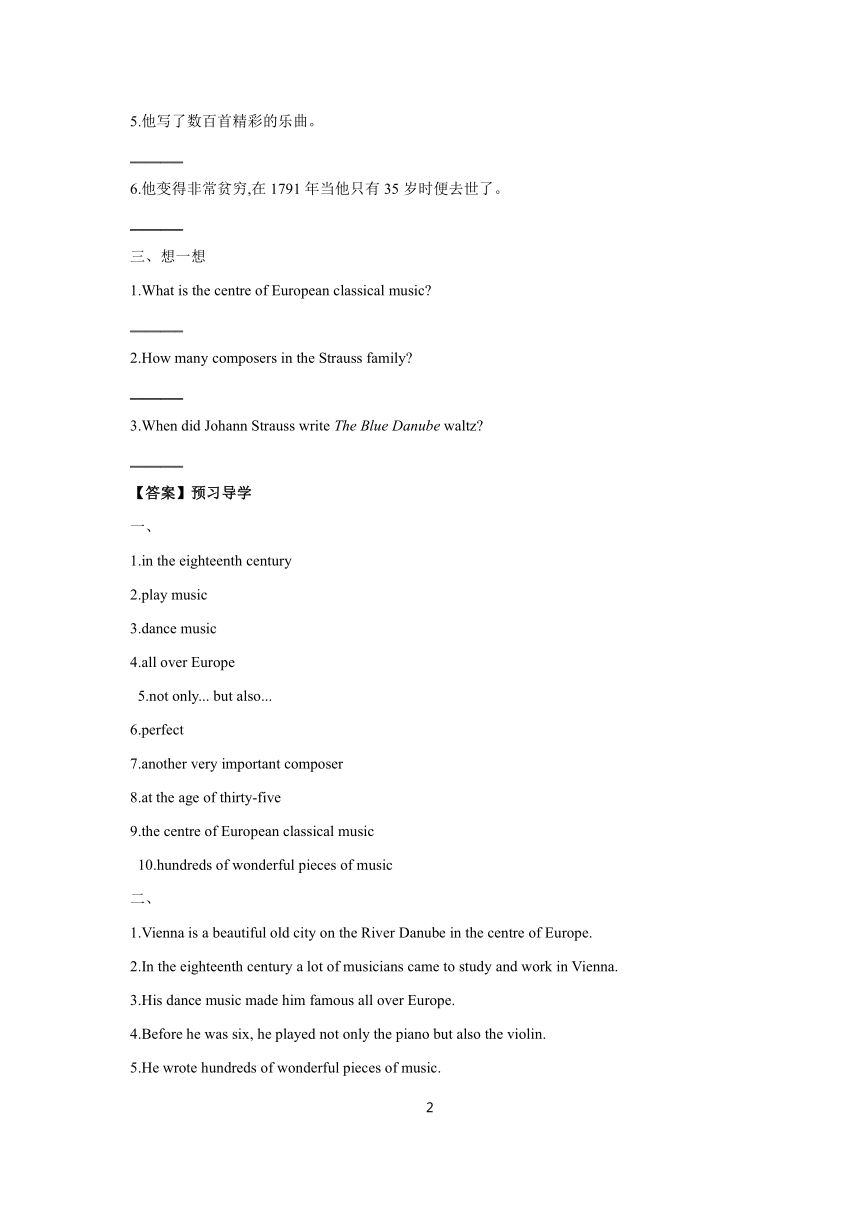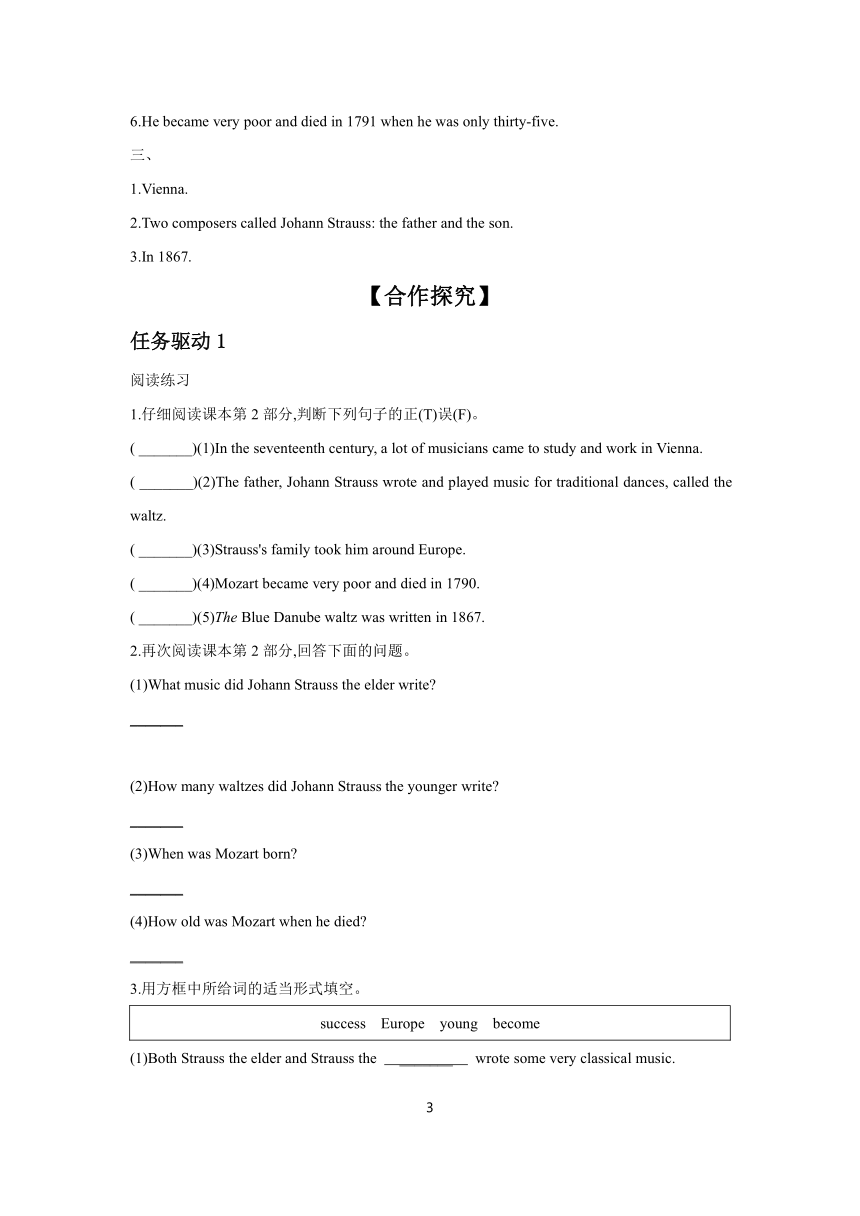Module 12 Wesstern music Unit 2 学案 2023-2024学年初中英语外研版七年级下册(含答案)
文档属性
| 名称 | Module 12 Wesstern music Unit 2 学案 2023-2024学年初中英语外研版七年级下册(含答案) |

|
|
| 格式 | docx | ||
| 文件大小 | 26.1KB | ||
| 资源类型 | 教案 | ||
| 版本资源 | 外研版 | ||
| 科目 | 英语 | ||
| 更新时间 | 2024-02-20 23:24:00 | ||
图片预览



文档简介
Module 12 Unit 2
Vienna is the centre of European classical music.
◎课时重点:
1.学习本课的重点单词及短语;熟练运用一些重点单词;了解维也纳的相关知识。
2.学习三位伟大音乐家的相关知识以及相应介绍方法;能用英语介绍你所熟悉的一位音乐家。
【预习导学】
一、填一填
1.在18 世纪 _______
2.演奏音乐 _______
3.舞曲 _______
4.全欧洲 _______
5.不但……而且…… _______
6.完美的 _______
7.另一位非常重要的作曲家 _______
8.在三十五岁时 _______
9.欧洲古典音乐的中心 _______
10.数百首精彩的乐曲 _______
二、译一译
1.维也纳是欧洲中心多瑙河畔一座美丽而古老的城市。
_______
2.在十八世纪,许多音乐家来维也纳学习和工作。
_______
3.他的舞曲使他闻名于全欧洲。
_______
4.在他六岁以前,他既会弹奏钢琴又会演奏小提琴。
_______
5.他写了数百首精彩的乐曲。
_______
6.他变得非常贫穷,在1791年当他只有35岁时便去世了。
_______
三、想一想
1.What is the centre of European classical music
_______
2.How many composers in the Strauss family
_______
3.When did Johann Strauss write The Blue Danube waltz
_______
【答案】预习导学
一、
1.in the eighteenth century
2.play music
3.dance music
4.all over Europe
5.not only... but also...
6.perfect
7.another very important composer
8.at the age of thirty-five
9.the centre of European classical music
10.hundreds of wonderful pieces of music
二、
1.Vienna is a beautiful old city on the River Danube in the centre of Europe.
2.In the eighteenth century a lot of musicians came to study and work in Vienna.
3.His dance music made him famous all over Europe.
4.Before he was six, he played not only the piano but also the violin.
5.He wrote hundreds of wonderful pieces of music.
6.He became very poor and died in 1791 when he was only thirty-five.
三、
1.Vienna.
2.Two composers called Johann Strauss: the father and the son.
3.In 1867.
【合作探究】
任务驱动1
阅读练习
1.仔细阅读课本第2部分,判断下列句子的正(T)误(F)。
( _______)(1)In the seventeenth century, a lot of musicians came to study and work in Vienna.
( _______)(2)The father, Johann Strauss wrote and played music for traditional dances, called the waltz.
( _______)(3)Strauss's family took him around Europe.
( _______)(4)Mozart became very poor and died in 1790.
( _______)(5)The Blue Danube waltz was written in 1867.
2.再次阅读课本第2部分,回答下面的问题。
(1)What music did Johann Strauss the elder write
_______
(2)How many waltzes did Johann Strauss the younger write
_______
(3)When was Mozart born
_______
(4)How old was Mozart when he died
_______
3.用方框中所给词的适当形式填空。
success Europe young become
(1)Both Strauss the elder and Strauss the _______ wrote some very classical music.
(2)Another _______ composer was Mozart.
(3)Mozart _______ very poor and died in 1971.
(4)All three were great _______ musicians.
任务驱动2 众说纷纭
1.根据课本第2部分的内容,进行对话练习。教师可以将某一位音乐家的相关信息写在黑板上,先找一个学生上来和教师配合做示范,然后小组内进行对话练习。
完成任务所需的语言结构:
A:Where was... born
B:He was born in...
A:What was he famous for
B:He was famous for...
A:How many...did he write
B:He wrote...
...
2.根据你的个人情况,回答下面的问题。
(1)Which composer do you like best
(2)What was he/she famous for
(3)Where was he/she born
(4)Why do you like him/her
(5)Is his/her music still popular today
任务驱动3 听读练习
1.以小组的形式选出正确的问答语,并进行问答练习。教师将全班分为A、B两个小组,对一些作曲家的相关知识进行问答练习。
Group A:
(1)What is your favourite composers
(2)What was he famous for
(3)When did he write it
(4)When was he born
(5)What was he called
Group B:
a:I like Xian Xinhai best.
b:He was famous for the song The Yellow River.
c:He wrote it in 1939.
d:He was born in 1905.
e:He was called the People's Musician.
2.听录音,进行朗读练习。
【答案】合作探究
任务驱动一 阅读练习
1.(1)F (2)T (3)F (4)F (5)T
2.(1)Traditional dances, called the waltz.
(2)He wrote over 150 waltzes.
(3)He was born in 1756.
(4)He was only thirty-five.
3.(1)younger
(2)successful
(3)became
(4)European
任务驱动三 听读练习
【知识超市】
●The son, Johann Strauss the younger, was also very successful and popular.儿子小施特劳斯也是非常成功的和受欢迎的。
successful作形容词,意为“成功的”,其构成的短语:be successful in...意为“在……方面是成功的”。
success作名词,意为“成功”,其构成的短语:have success in...意为“在……方面获得成功”。
succeed作动词,意为“成功”,其构成的短语:succeed in...意为“在……方面成功”。
做一做:单项选择。
( _______)1.My sister has in learning English.
A.success B.successful
C.succeed D.successes
( _______)2.I succeed the exam.
A.in pass B.passing
C.to pass D.in passing
●Before he was six, he played not only the piano but also the violin. 在他六岁以前,他既会弹奏钢琴又会演奏小提琴。
not only...but also...意为“不仅……而且……”,是表示联合关系的并列连词。需要注意的是not only...but also...如果连接的两个成分作主语,则遵循就近原则。例如:
He was not only a writer but also an actor.他不仅是个作家,也是一个演员。
Not only my brothers but also my father likes listening to pop music.不仅我的哥哥们喜欢听流行音乐,而且我的爸爸也喜欢听。
play the piano意为“弹钢琴”。演奏某种乐器使用play,而且乐器前必须带the; play 还可用于某运动类项目前,但运动类项目前不能带the。例如:
I like to play football, but she likes to play the violin.我喜欢踢足球,但是她喜欢拉小提琴。
做一做:单项选择。
( _______)1.Not only you but also he to go hiking.
A.want
B.wants
C.to want
D.wanting
( _______)2.My friend plays not only piano but also violin.
A.the; 不填 B.a; 不填
C.the; the D.a; a
●He wrote hundreds of wonderful pieces of music. 他写了数百首精彩的乐曲。
hundreds of 意为“数百的”; hundred、 thousand、 million、 billion 等词前有具体数字时,词尾用单数;当不与具体数字连用时,则词尾必须加s和of。例如:
five hundred people 五百人; hundreds of people 数百人
做一做:单项选择。
( _______)1. visitors come to China every year.
A.Thousands of
B.Ten thousands
C.Ten thousand of
D.Thousand of
( _______)2.There are people in the factory now.
A.hundred of
B.two hundreds
C.hundreds of
D.hundred
【答案】
知识超市
做一做:
1.A 2.D
做一做:
1.B 2.C
做一做:
1.A 2.C
2
Vienna is the centre of European classical music.
◎课时重点:
1.学习本课的重点单词及短语;熟练运用一些重点单词;了解维也纳的相关知识。
2.学习三位伟大音乐家的相关知识以及相应介绍方法;能用英语介绍你所熟悉的一位音乐家。
【预习导学】
一、填一填
1.在18 世纪 _______
2.演奏音乐 _______
3.舞曲 _______
4.全欧洲 _______
5.不但……而且…… _______
6.完美的 _______
7.另一位非常重要的作曲家 _______
8.在三十五岁时 _______
9.欧洲古典音乐的中心 _______
10.数百首精彩的乐曲 _______
二、译一译
1.维也纳是欧洲中心多瑙河畔一座美丽而古老的城市。
_______
2.在十八世纪,许多音乐家来维也纳学习和工作。
_______
3.他的舞曲使他闻名于全欧洲。
_______
4.在他六岁以前,他既会弹奏钢琴又会演奏小提琴。
_______
5.他写了数百首精彩的乐曲。
_______
6.他变得非常贫穷,在1791年当他只有35岁时便去世了。
_______
三、想一想
1.What is the centre of European classical music
_______
2.How many composers in the Strauss family
_______
3.When did Johann Strauss write The Blue Danube waltz
_______
【答案】预习导学
一、
1.in the eighteenth century
2.play music
3.dance music
4.all over Europe
5.not only... but also...
6.perfect
7.another very important composer
8.at the age of thirty-five
9.the centre of European classical music
10.hundreds of wonderful pieces of music
二、
1.Vienna is a beautiful old city on the River Danube in the centre of Europe.
2.In the eighteenth century a lot of musicians came to study and work in Vienna.
3.His dance music made him famous all over Europe.
4.Before he was six, he played not only the piano but also the violin.
5.He wrote hundreds of wonderful pieces of music.
6.He became very poor and died in 1791 when he was only thirty-five.
三、
1.Vienna.
2.Two composers called Johann Strauss: the father and the son.
3.In 1867.
【合作探究】
任务驱动1
阅读练习
1.仔细阅读课本第2部分,判断下列句子的正(T)误(F)。
( _______)(1)In the seventeenth century, a lot of musicians came to study and work in Vienna.
( _______)(2)The father, Johann Strauss wrote and played music for traditional dances, called the waltz.
( _______)(3)Strauss's family took him around Europe.
( _______)(4)Mozart became very poor and died in 1790.
( _______)(5)The Blue Danube waltz was written in 1867.
2.再次阅读课本第2部分,回答下面的问题。
(1)What music did Johann Strauss the elder write
_______
(2)How many waltzes did Johann Strauss the younger write
_______
(3)When was Mozart born
_______
(4)How old was Mozart when he died
_______
3.用方框中所给词的适当形式填空。
success Europe young become
(1)Both Strauss the elder and Strauss the _______ wrote some very classical music.
(2)Another _______ composer was Mozart.
(3)Mozart _______ very poor and died in 1971.
(4)All three were great _______ musicians.
任务驱动2 众说纷纭
1.根据课本第2部分的内容,进行对话练习。教师可以将某一位音乐家的相关信息写在黑板上,先找一个学生上来和教师配合做示范,然后小组内进行对话练习。
完成任务所需的语言结构:
A:Where was... born
B:He was born in...
A:What was he famous for
B:He was famous for...
A:How many...did he write
B:He wrote...
...
2.根据你的个人情况,回答下面的问题。
(1)Which composer do you like best
(2)What was he/she famous for
(3)Where was he/she born
(4)Why do you like him/her
(5)Is his/her music still popular today
任务驱动3 听读练习
1.以小组的形式选出正确的问答语,并进行问答练习。教师将全班分为A、B两个小组,对一些作曲家的相关知识进行问答练习。
Group A:
(1)What is your favourite composers
(2)What was he famous for
(3)When did he write it
(4)When was he born
(5)What was he called
Group B:
a:I like Xian Xinhai best.
b:He was famous for the song The Yellow River.
c:He wrote it in 1939.
d:He was born in 1905.
e:He was called the People's Musician.
2.听录音,进行朗读练习。
【答案】合作探究
任务驱动一 阅读练习
1.(1)F (2)T (3)F (4)F (5)T
2.(1)Traditional dances, called the waltz.
(2)He wrote over 150 waltzes.
(3)He was born in 1756.
(4)He was only thirty-five.
3.(1)younger
(2)successful
(3)became
(4)European
任务驱动三 听读练习
【知识超市】
●The son, Johann Strauss the younger, was also very successful and popular.儿子小施特劳斯也是非常成功的和受欢迎的。
successful作形容词,意为“成功的”,其构成的短语:be successful in...意为“在……方面是成功的”。
success作名词,意为“成功”,其构成的短语:have success in...意为“在……方面获得成功”。
succeed作动词,意为“成功”,其构成的短语:succeed in...意为“在……方面成功”。
做一做:单项选择。
( _______)1.My sister has in learning English.
A.success B.successful
C.succeed D.successes
( _______)2.I succeed the exam.
A.in pass B.passing
C.to pass D.in passing
●Before he was six, he played not only the piano but also the violin. 在他六岁以前,他既会弹奏钢琴又会演奏小提琴。
not only...but also...意为“不仅……而且……”,是表示联合关系的并列连词。需要注意的是not only...but also...如果连接的两个成分作主语,则遵循就近原则。例如:
He was not only a writer but also an actor.他不仅是个作家,也是一个演员。
Not only my brothers but also my father likes listening to pop music.不仅我的哥哥们喜欢听流行音乐,而且我的爸爸也喜欢听。
play the piano意为“弹钢琴”。演奏某种乐器使用play,而且乐器前必须带the; play 还可用于某运动类项目前,但运动类项目前不能带the。例如:
I like to play football, but she likes to play the violin.我喜欢踢足球,但是她喜欢拉小提琴。
做一做:单项选择。
( _______)1.Not only you but also he to go hiking.
A.want
B.wants
C.to want
D.wanting
( _______)2.My friend plays not only piano but also violin.
A.the; 不填 B.a; 不填
C.the; the D.a; a
●He wrote hundreds of wonderful pieces of music. 他写了数百首精彩的乐曲。
hundreds of 意为“数百的”; hundred、 thousand、 million、 billion 等词前有具体数字时,词尾用单数;当不与具体数字连用时,则词尾必须加s和of。例如:
five hundred people 五百人; hundreds of people 数百人
做一做:单项选择。
( _______)1. visitors come to China every year.
A.Thousands of
B.Ten thousands
C.Ten thousand of
D.Thousand of
( _______)2.There are people in the factory now.
A.hundred of
B.two hundreds
C.hundreds of
D.hundred
【答案】
知识超市
做一做:
1.A 2.D
做一做:
1.B 2.C
做一做:
1.A 2.C
2
同课章节目录
- Module 1 Lost and found
- Unit 1 Whose bag is this?
- Unit 2 Are they yours?
- Unit 3 Language in use
- Module 2 What can you do ?
- Unit 1 I can play the piano
- Unit 2 I can run really fast
- Unit 3 Language in use
- Module 3 Making plans
- Unit 1 What are you going to do at the weekends?
- Unit 2 We're going to cheer the players.
- Unit 3 Language in use
- Module 4 Life in the future
- Unit 1 Everyone will study at home
- Unit 2 Every family will have a small plane.
- Unit 3 Language in use
- Module 5 Shopping
- Unit 1 What can I do for you?
- Unit 2 You can buy everything on the Internet
- Unit 3 Language in use
- Module 6 Around town
- Unit 1 Could you tell me how to get to the Nationa
- Unit 2 The London Eye is on your right.
- Unit 3 Language in use
- Revision module A
- Module 7 My past life
- Unit 1 I was born in a small village.
- Unit 2 I was born in Quincy.
- Unit 3 Language in use
- Module 8 Story time
- Unit 1 Once upon a time….
- Unit 2 Goldilocks hurried out of the house.
- Unit 3 Language in use
- Module 9 Life history
- Unit 1 He left school and began work at the age of
- Unit 2 He decided to be an actor.
- Unit 3 Language in use
- Module 10 A holiday journey
- Unit 1 What did you do?
- Unit 2 This morning we took a walk.
- Unit 3 Language in use
- Module 11 Body language
- Unit 1 They touch noses!
- Unit 2 Here are some ways to welcome them.
- Unit 3 Language in use
- Module 12 Western music
- Unit 1 It's so beautiful!
- Unit 2 Vienna is the centre of European classical
- Unit 3 Language in use
- Revision module B
